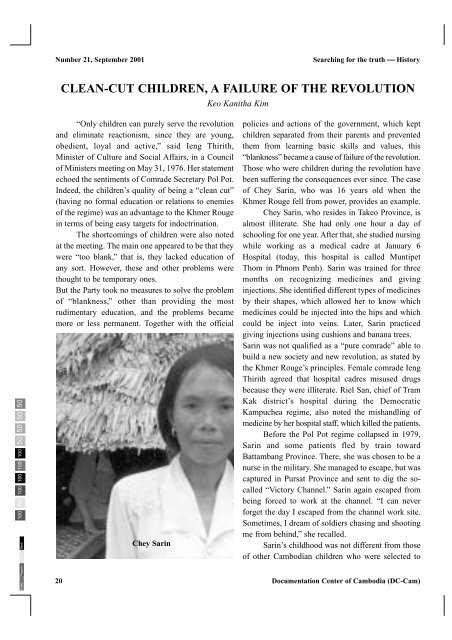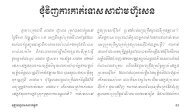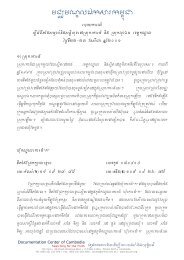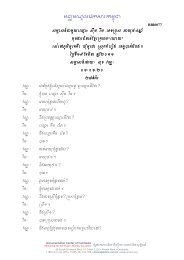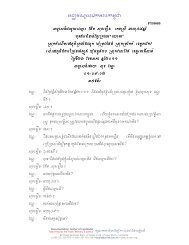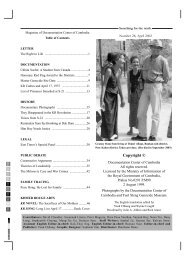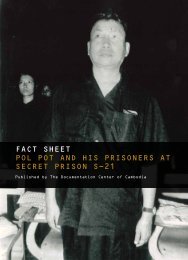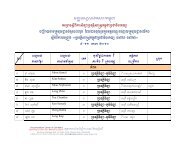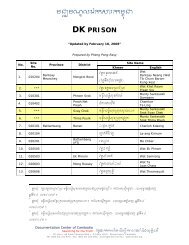Searching for the truth Issues 21 - Documentation Center of Cambodia
Searching for the truth Issues 21 - Documentation Center of Cambodia
Searching for the truth Issues 21 - Documentation Center of Cambodia
Create successful ePaper yourself
Turn your PDF publications into a flip-book with our unique Google optimized e-Paper software.
100 100 100 100 100 100 50 50 50 50<br />
Black<br />
Yellow<br />
Magenta<br />
Cyan<br />
Number <strong>21</strong>, September 2001<br />
20<br />
<strong>Searching</strong> <strong>for</strong> <strong>the</strong> <strong>truth</strong> ⎯ History<br />
CLEAN-CUT CHILDREN, A FAILURE OF THE REVOLUTION<br />
“Only children can purely serve <strong>the</strong> revolution<br />
and eliminate reactionism, since <strong>the</strong>y are young,<br />
obedient, loyal and active,” said Ieng Thirith,<br />
Minister <strong>of</strong> Culture and Social Affairs, in a Council<br />
<strong>of</strong> Ministers meeting on May 31, 1976. Her statement<br />
echoed <strong>the</strong> sentiments <strong>of</strong> Comrade Secretary Pol Pot.<br />
Indeed, <strong>the</strong> children’s quality <strong>of</strong> being a “clean cut”<br />
(having no <strong>for</strong>mal education or relations to enemies<br />
<strong>of</strong> <strong>the</strong> regime) was an advantage to <strong>the</strong> Khmer Rouge<br />
in terms <strong>of</strong> being easy targets <strong>for</strong> indoctrination.<br />
The shortcomings <strong>of</strong> children were also noted<br />
at <strong>the</strong> meeting. The main one appeared to be that <strong>the</strong>y<br />
were “too blank,” that is, <strong>the</strong>y lacked education <strong>of</strong><br />
any sort. However, <strong>the</strong>se and o<strong>the</strong>r problems were<br />
thought to be temporary ones.<br />
But <strong>the</strong> Party took no measures to solve <strong>the</strong> problem<br />
<strong>of</strong> “blankness,” o<strong>the</strong>r than providing <strong>the</strong> most<br />
rudimentary education, and <strong>the</strong> problems became<br />
more or less permanent. Toge<strong>the</strong>r with <strong>the</strong> <strong>of</strong>ficial<br />
Chey Sarin<br />
Keo Kanitha Kim<br />
policies and actions <strong>of</strong> <strong>the</strong> government, which kept<br />
children separated from <strong>the</strong>ir parents and prevented<br />
<strong>the</strong>m from learning basic skills and values, this<br />
“blankness” became a cause <strong>of</strong> failure <strong>of</strong> <strong>the</strong> revolution.<br />
Those who were children during <strong>the</strong> revolution have<br />
been suffering <strong>the</strong> consequences ever since. The case<br />
<strong>of</strong> Chey Sarin, who was 16 years old when <strong>the</strong><br />
Khmer Rouge fell from power, provides an example.<br />
Chey Sarin, who resides in Takeo Province, is<br />
almost illiterate. She had only one hour a day <strong>of</strong><br />
schooling <strong>for</strong> one year. After that, she studied nursing<br />
while working as a medical cadre at January 6<br />
Hospital (today, this hospital is called Muntipet<br />
Thom in Phnom Penh). Sarin was trained <strong>for</strong> three<br />
months on recognizing medicines and giving<br />
injections. She identified different types <strong>of</strong> medicines<br />
by <strong>the</strong>ir shapes, which allowed her to know which<br />
medicines could be injected into <strong>the</strong> hips and which<br />
could be inject into veins. Later, Sarin practiced<br />
giving injections using cushions and banana trees.<br />
Sarin was not qualified as a “pure comrade” able to<br />
build a new society and new revolution, as stated by<br />
<strong>the</strong> Khmer Rouge’s principles. Female comrade Ieng<br />
Thirith agreed that hospital cadres misused drugs<br />
because <strong>the</strong>y were illiterate. Riel San, chief <strong>of</strong> Tram<br />
Kak district’s hospital during <strong>the</strong> Democratic<br />
Kampuchea regime, also noted <strong>the</strong> mishandling <strong>of</strong><br />
medicine by her hospital staff, which killed <strong>the</strong> patients.<br />
Be<strong>for</strong>e <strong>the</strong> Pol Pot regime collapsed in 1979,<br />
Sarin and some patients fled by train toward<br />
Battambang Province. There, she was chosen to be a<br />
nurse in <strong>the</strong> military. She managed to escape, but was<br />
captured in Pursat Province and sent to dig <strong>the</strong> socalled<br />
“Victory Channel.” Sarin again escaped from<br />
being <strong>for</strong>ced to work at <strong>the</strong> channel. “I can never<br />
<strong>for</strong>get <strong>the</strong> day I escaped from <strong>the</strong> channel work site.<br />
Sometimes, I dream <strong>of</strong> soldiers chasing and shooting<br />
me from behind,” she recalled.<br />
Sarin’s childhood was not different from those<br />
<strong>of</strong> o<strong>the</strong>r <strong>Cambodia</strong>n children who were selected to<br />
<strong>Documentation</strong> <strong>Center</strong> <strong>of</strong> <strong>Cambodia</strong> (DC-Cam)


